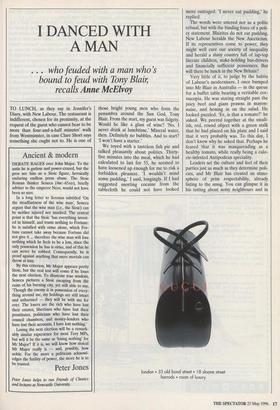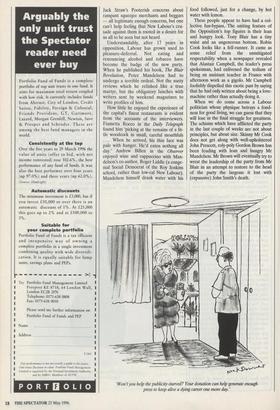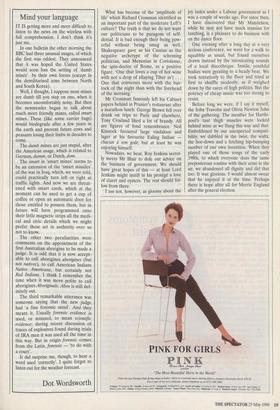I DANCED WITH A MAN
. . . who feuded with a man who's bound to feud with Tony Blair,
recalls Anne McElvoy
TO LUNCH, as they say in Jennifer's Diary, with New Labour. The restaurant is indifferent, chosen for its proximity, at the request of the guest who cannot bear to be more than four-and-a-half minutes' walk from Westminster, in case Clare Short says something she ought not to. He is one of those bright young men who form the penumbra around the Sun God, Tony Blair. From the start, my guest was fidgety. Would he like a glass of wine? 'No. I never drink at lunchtime.' Mineral water, then. Definitely no bubbles. And to start? 'I won't have a starter.'
We toyed with a tasteless fish pie and talked pleasantly about politics. Thirty- five minutes into the meal, which he had calculated to last for 55, he seemed to have loosened up enough for me to risk a forbidden pleasure. 'I wouldn't mind some pudding,' I said, longingly. If I had suggested snorting cocaine from the tablecloth he could not have looked more outraged. 'I never eat pudding,' he replied.
The words were uttered not as a polite refusal, but with the binding force of a poli- cy statement. Blairites do not eat pudding. New Labour heralds the New Asceticism. If its representives come to power, they might well cure our society of inequality and herald a shiny country full of lap-top literate children, stake-holding bus-drivers and financially sufficient pensioners. But will there be lunch in the New Britain?
Very little of it, to judge by the habits of Labour's modernisers. I once bumped into Mr Blair in Australia — in the queue for a buffet table bearing a veritable cor- nucopia. He was staring straight past the juicy beef and giant prawns in mayon- naise, and honing in on the salad. He looked puzzled. 'Er, is that a tomato?' he asked. We peered together at the small- ish, red, round object with a green stalk that he had placed on his plate and I said that it very probably was. To this day, I don't know why he asked that. Perhaps he feared that it was masquerading as a healthy tomato, while really being a calo- rie-infested Antipodean speciality.
Leaders set the culture and feel of their parties just as much as they determine poli- cies, and Mr Blair has created an atmo- sphere of prim respectability, already listing to the smug. You can glimpse it in his tutting about noisy neighbours and in Jack Straw's Pooterish concerns about rampant squeejee merchants and beggars — all legitimate enough concerns, but one can't help feeling that New Labour's cru- sade against them is rooted in a desire for us all to be seen but not heard.
Understandably, after 17 years in opposition, Labour has grown used to pleasure-deferral. Not eating and renouncing alcohol and tobacco have become the badge of the new party. When he published his book, The Blair Revolution, Peter Mandelson had to undergo a terrible ordeal. Not the nasty reviews which he relished like a true martyr, but the obligatory lunches with writers sent by weekend magazines to write profiles of him.
How little he enjoyed the experience of the capital's finest restaurants is evident from the accounts of the interviewers. Fiametta Rocco in the Daily Telegraph found him 'picking at the remains of a lit- tle woodcock in small, careful mouthfuls . . . When he arrived, his thin face was pale with hunger. He'd eaten nothing all day.' Andrew Billen in the Observer enjoyed wine and cappuccino with Man- delson's co-author, Roger Liddle (a conge- nial Social Democrat of the Roy Jenkins school, rather than low-cal New Labour). Mandelson himself drank water with his food followed, just for a change, by hot water with lemon.
These people appear to have had a col- lective fun-bypass. The uniting feature of the Opposition's top figures is their lean and hungry look. Tony Blair has a tiny waist and an ungenerous bottom. Robin Cook looks like a fell-runner. It came as some relief from the unmitigated respectability when a newspaper revealed that Alastair Campbell, the leader's press spokesman, had enlivened the tedium of being an assistant teacher in France with afternoon work as a gigolo. Mr Campbell foolishly dispelled this exotic past by saying that he had only written about being a love- machine rather than actually doing it.
When we do come across a Labour politician whose physique betrays a fond- ness for good living, we can guess that they will lose in the final struggle for greatness. The schisms which have afflicted the party in the last couple of weeks are not about principles, but about size. Skinny Mr Cook does not get along with well-upholstered John Prescott, roly-poly Gordon Brown has been feuding with lean and hungry Mr Mandelson. Mr Brown will eventually try to wrest the leadership of the party from Mr Blair in an attempt to restore to the head of the party the largesse it lost with (expansive) John Smith's death.
'Won't you help the publicity-starved? Your donation can help generate enough press to keep alive a dying career one more day.' What has become of the 'amplitude of life' which Richard Crossman identified as an important part of the moderate Left's culture? The truth is that we do not want our politicians to be paragons of self- denial. It is bad enough their being pow- erful without being smug as well. Shakespeare gave us his Cassius as the negative archetype of the scheming politician, and Menenius in Coriolanus, the spin-doctor of Rome, as a positive figure. 'One that loves a cup of hot wine with not a drop of allaying Tiber in't . . . One that converses more with the but- tock of the night than with the forehead of the morning.'
Mr Crossman famously left his Cabinet papers behind in Prunier's restaurant after a marathon lunch. George Brown fell over drunk on trips to Paris and elsewhere, Tony Crosland liked a lot of brandy. All are figures of fond remembrance. Neil Kinnock favoured large vindaloos and lager at his favourite Ealing Indian — chacun a son goi2t, but at least he was enjoying himself.
Nowadays, we hear, Roy Jenkins secret- ly meets Mr Blair to dole out advice on the business of government. We should have great hopes of this — at least Lord Jenkins might instill in his protégé a love of claret and oysters. The rest should fol- low from there.
I am not, however, as gloomy about the joy index under a Labour government as I was a couple of weeks ago. For since then, I have discovered that Mr Mandelson, while he may not have much stamina for lunching, is a pleasure to do business with on the dance floor.
One evening after a long day at a very serious conference, we went for a walk to squabble as usual, but found ourselves drawn instead by the intoxicating sounds of a local discotheque. Inside, youthful bodies were gyrating to a heady beat. We took tentatively to the floor and tried at first to shuffle modestly, as if weighed down by the cares of high politics. But the potency of cheap music was too strong to resist.
Before long we were, if I say it myself, the John Travolta and Olivia Newton John of the gathering. The member for Hartle- pool's taut thigh muscles were locked behind mine as we flung this way and that. Emboldened by our unexpected compati- bility, we dabbled in the twist, the waltz, the hoe-down and a fetching hip-bumping number of our own invention. When they played one of those songs of the early 1980s, to which everyone does the same preposterous routine with their arms in the air, we abandoned all dignity and did that too. It was glorious. I would almost swear that he enjoyed it at the time. Perhaps there is hope after all for Merrie England after the general election.




























































 Previous page
Previous page